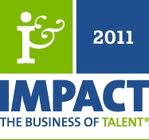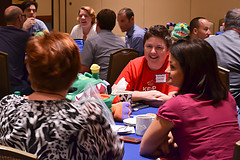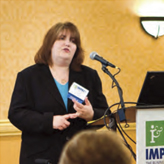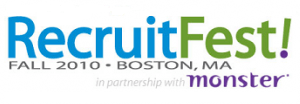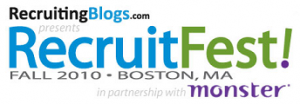This was originally posted on the MonsterThinking blog on July 29, 2011 found here.
As business leaders, we’ve always known our customers talk about their experience with us. Sometimes it’s good…sometimes, well, not so much.
Ten years ago, heck, five years ago, if we really cared about what our customers were saying to their families and friends about their experiences with us, we sent surveys to find out what they were thinking, feeling and saying.
Today? Well, we’ve got the social web to provide a ready and steady stream of information about what our customers, employees, competitors, stockholders, investors, vendors, suppliers, analysts, employment candidates, neighbors and random strangers are thinking, feeling and saying about our organizations.
In fact, there’s so much information flowing that new departments within the customer service, public relations, sales, marketing, human resources, legal and investor  relations divisions (and sometimes in all of them simultaneously) are being created to monitor what’s being said by whom and to figure out what to do about it.
relations divisions (and sometimes in all of them simultaneously) are being created to monitor what’s being said by whom and to figure out what to do about it.
With all the noise, with all the new tools (it’s not just Twitter and YouTube anymore), with all the organization attention being paid, why should an executive enter into the world of social media – beyond their personal LinkedIn account and FaceBookpage? Here’s one executive’s story:
When I was leading SHRM (the Society for Human Resource Management, with more than 250,000 members in over 140 countries) as its Chief Operating Officer, I became aware of a pretty large group of very smart, very active and leading edge HR professionals who were quite vocal about their disdain for the organization. They were talking with each other through various social and new media tools and had accidentally (I think) created a community that I thought of as the “anti-SHRM gang.”
But here was the thing: they were terrific HR leaders and consultants. They were experts in the field. Many were certified by the Human Resource Certification Institute. They were active in learning and sharing their knowledge as mentors and coaches – formally and informally. They were great! Many of them are future Fortune 500 Chief Human Resource Officers. And except for their anti-SHRM sentiments, they were just like SHRM 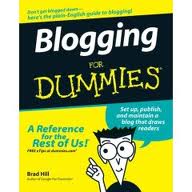 members…with one major exception: they were experimenting with and diving head long into the world of social media.
members…with one major exception: they were experimenting with and diving head long into the world of social media.
It was very clear to me that these were just the folks SHRM needed as members at the national level and leaders at the local level. They included all the age demographics – this wasn’t just a GenX thing. And they were writing blogs, hosting and participating in internet radio shows, innovating ways to use Twitter – all in an effort to create a community of like-minded professionals. (They were also innovating ways to use social media applications to make their practice of HR more effective and efficient.) And I couldn’t get them out of my head: I wanted them involved in moving SHRM forward.
So I took up the challenge and created a Twitter account. Because I wanted to be transparent about who I was, I chose the handle @SHRMCOO (now @ChinaGorman). I wanted to let them know I was lurking. I would ask questions from time to time and I re-tweeted comments I found interesting. And I began to comment on blog posts that I thought were controversial. But mostly, I listened and responded with lightning speed if anyone asked me a question. In short, I listened.  I didn’t try to “tell” anyone anything. I didn’t try to recruit new members. I didn’t try to sell conference registrations. I simply engaged in order to learn what was on the mind of these future members. And I learned a lot!
I didn’t try to “tell” anyone anything. I didn’t try to recruit new members. I didn’t try to sell conference registrations. I simply engaged in order to learn what was on the mind of these future members. And I learned a lot!
The bottom line is that I made myself available in a transparent way to engage with our customers and potential customers. And although I was just one executive at the world’s largest HR association, the symbolism to the full HR community – members and nonmembers alike – was powerful for our organization. This community began to see SHRM in a new light. “If a SHRM executive was engaged with social media, maybe this isn’t my father’s/mother’s HR association after all.” And several of them joined and began to get involved. That was good, and I’m glad for that, but what was most important was to hear their voices, understand their issues, and engage them in conversation. We enlarged our community not by being willing to embrace the uncharted new world of social media but by taking advantage of a new source of business intelligence that informed us about what was on the minds of our audience. And so we grew in relevance. A good thing that created lots of benefits for the organization.
 Does social media pose organizational risks? Absolutely! But to ignore those in-the-moment opportunities to engage a new or current customer, save a former customer, support an employee or just see a new way of thinking about your products or service puts your organization at a competitive disadvantage.
Does social media pose organizational risks? Absolutely! But to ignore those in-the-moment opportunities to engage a new or current customer, save a former customer, support an employee or just see a new way of thinking about your products or service puts your organization at a competitive disadvantage.
So go ahead and put together your LinkedIn profile and begin to populate a BeKnown network on FaceBook. But be open to the richness of data available throughout the social web – and don’t just rely on your PR and marketing teams to report their findings to you. It means so much more when you engage yourself!
China will be speaking at Talent Net Live on July 29 in San Antonio, TX. Her track, Is Engagement the Antidote for Turnover?…Well, Maybe promises to be a lively session in which she’ll listen a lot!



